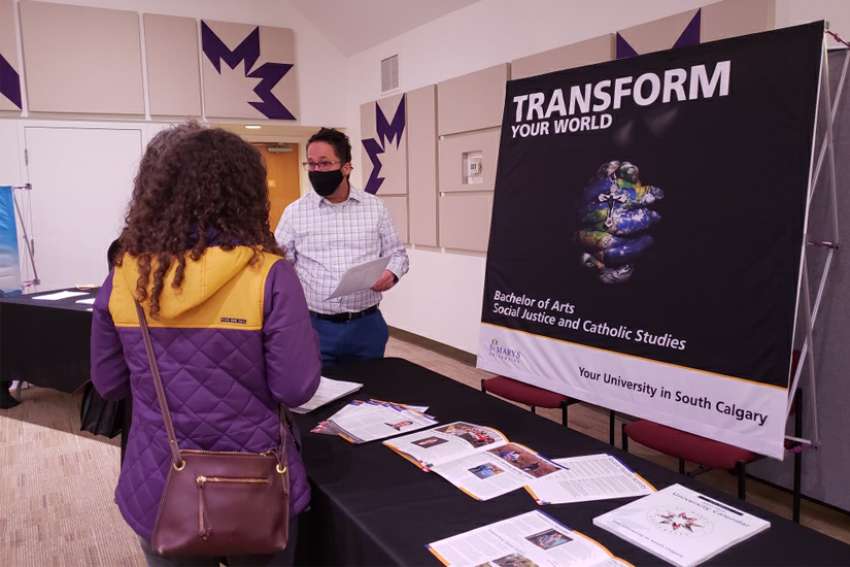Dr. Peter Baltutis, associate professor of history and religious studies at this Calgary-based institution, wants students and graduates to draw upon the historical, philosophical and religious ideas constituting the Catholic intellectual tradition to address real-world ethical, political and social issues.
“We looked at programs all across Canada and North America, and most of the programs that we saw, whether it be theology or Catholic studies, the challenge for a lot of them was what were they preparing their graduates to do?” said Baltutis, who is also St. Mary’s CWL Chair of Catholic Studies. “A lot of them, for better or for worse, were preparing them only towards further graduate studies in theology or for the seminary.”
Three other St. Mary’s current and former faculty members were instrumental in developing this program: Dr. Timothy Harvie, associate professor of philosophy and ethics, Dr. Michael McLeod, associate professor of political science, and Dr. Michael Duggan, a former professor of religious studies and CWL Chair of Catholic studies.
In the spirit of creating “the most versatile degree possible,” the architects engaged with a variety of community stakeholders to ask what skills and knowledge a St. Mary’s graduate would require to gain employment and thrive in that given profession. They interviewed people from the Diocese of Calgary, Catholic school boards in Alberta, seminaries, Calgary municipal staff and representatives from Catholic, Christian and secular homeless shelters, social service and other non-profit agencies.
Year four requires students to emphasize either the social justice or Catholic studies dimension, and to complete a 120-hour experiential capstone project.
“Our students are paired with a community organization for these 120 hours,” said Harvie, the program coordinator. “Students work directly with the community partner gaining practical experience for their vocation, making connections and attaining training and job growth. They then take that practical experience and bring it back in their final semester for a research project.
“So, it is not research that is abstracted up in an ivory tower, but rather is grounded in the realities of organizations and workers on the ground doing the hard work for their communities.”
Baltutis said empathy is one of the soft skills being nurtured in students through both the academic and real-world placements. He said this trait, along with effective communication, is necessary for graduates to create change in a polarized world.
“They are learning these soft skills like how to listen, and they are learning how to engage in civil discourse, and that’s a lost art,” said Baltutis. “The Catholic tradition is not politicized. It’s not left or right. It’s not Conservative, Liberal, NDP, Bloc Québécois or Green. The Catholic tradition transcends all of that. As I try to teach my students, being a Catholic means being involved in all of these circles and all these ideas, but also speaking critically of them.”
Two of the completed capstone experiences include a pupil supporting the St. Francis Xavier Chaplaincy Centre’s student programs at the University of Calgary, while another supported the Calgary diocese’s initiatives to support children who are neurodivergent or who are on the autism spectrum. One student with Sport Calgary helping marginalized individuals and communities access sport opportunities.
Black Lives Matter protests and the discovery of unmarked graves at former residential school sites are two landmark social events discussed at length during Social Justice & Catholic Studies classes at St. Mary’s. Harvie said students — already steeped with knowledge about the Truth and Reconciliation Commission (TRC) — wondered how the Doctrine of Discovery (15th-century Catholic law that granted land rights to Europen nations settling the “New World” and occupied by “heathens, pagans and infidels”) applied to the discoveries of last summer. Harvie met one-on-one with a student to continue exploring this topic.
“We read through the encyclicals of Pope Nicholas V and Pope Alexandre VI, and then reading statements from the Canadian (Conference of) Catholic Bishops to see how they interact with those encyclicals, and then discovering how Indigenous legal groups are citing the encyclicals,” he said.
Semester one of this degree launched in 2019. While a four-year program, multiple students enrolled in this program had requisite transferable credits from other St. Mary’s disciplines to graduate within two years. Two of the program’s current 16 students will become the historic inaugural graduates when this semester concludes next month.


